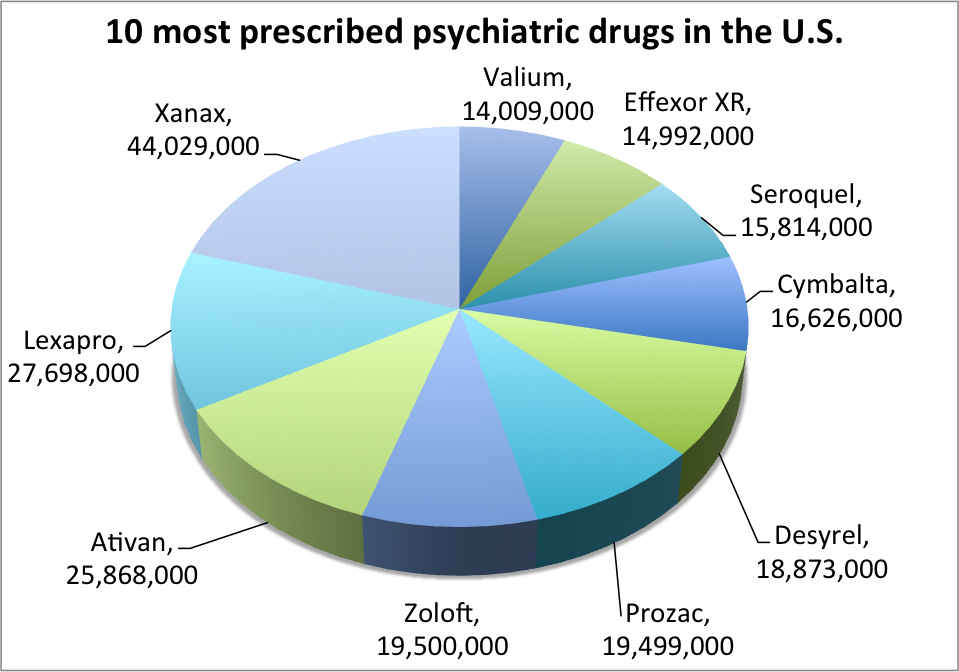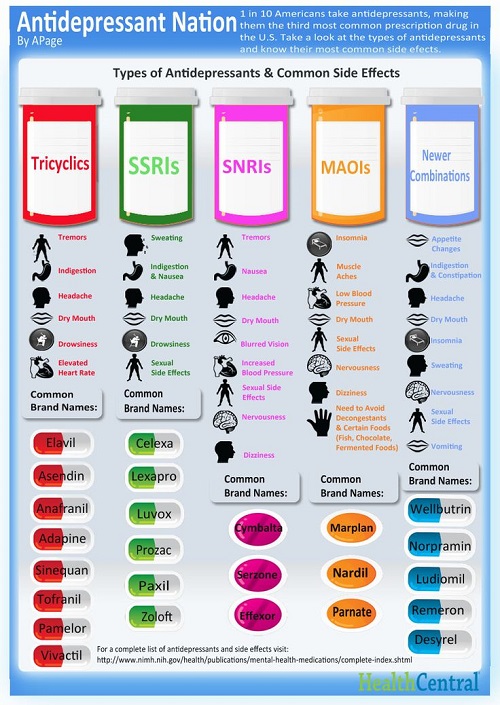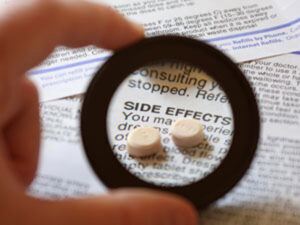Common Side Effects of Psychiatric
Medications
.. …. ….
 ……
……
| Medication | Examples | Prescribed for: | Side effects |
| Antidepressants | Selective serotonin reuptake inhibitors (SSRIs) • Celexa, Prozac, Luvox, Paxil and Zoloft . Tricyclic antidepressants (older antidepressants) • Anafranil, Pamelor, and Tofranil. |
Clinical depression | • Decreased sex drive or no sex drive at all • Dry mouth • Nausea • Insomnia — inability to get to sleep, or difficulty staying asleep • Increased anxiousness or restlessness • Drowsiness • Weight gain • Constipation or diarrhea • Headaches • Increased sweating • Dizziness |
| Antipsychotics | Antipsychotic medications are generally divided into two categories: 1. Typical (first generation) antipsychotics 2. Atypical (second generation) antipsychotics . 1. Older/first-generation antipsychotic medications are also called conventional “typical” antipsychotics or “neuroleptics”. • Chlorpromazine (Largactil) • Flupenthixol (Fluanxol), • Fluphenazine (Modecate) • Haloperidol (Haldol) • loxapine (Loxapac) • Perphenazine (Trilafon • Thiothixene (Navane) • Zuclopenthixol (Clopixol).2. Newer/second-generation medications are also called “atypical” antipsychotics. • Risperidone (Risperdal), • Quetiapine (Seroquel) • Olanzapine (Zyprexa) • Ziprasidone (Zeldox) • Paliperidone (Invega) • Aripiprazole (Abilify) •Clozapine (Clozaril) |
– Psychosis which can be a symptom of a physical condition such as drug abuse or a mental disorder such as schizophrenia, bipolar disorder, or very severe depression (also known as “psychotic depression”).
– Antipsychotic medications are often used in combination with other medications to treat delirium, dementia, and mental health conditions including: |
• Drowsiness • Restlessness • Muscle Spasms • Tremor • Dry Mouth • Blurred Vision • Photosensitivity • Orthostatic hypotension .. The long-term side effects include: • Tardive dyskinesia (TD), a disorder characterized by involuntary movements most often affecting the mouth, lips and tongue, and sometimes the trunk or other parts of the body such as arms and legs. ** Taking these drugs over a long period of time, usually many years increases the risk of long-term side effects. |
| Benzodiazepines | – Xanax, Klonopin, Valium and Ativan. | Anxiety disorders, panic attacks, and phobias. | • Drowsiness • Impaired coordination • Memory impairment • Dry mouth |
| Mood Stabilizers | – Lithium
– Anticonvulsant medications are also used as mood stabilizers. |
Bipolar disorder, mood swings associated with other mental disorders, and in some cases, to augment the effect of other medications used to treat depression. | • Itching, rash • Excessive thirst • Frequent urination • Tremor (shakiness) of the hands • Nausea and vomiting • Slurred speech • Fast, slow, irregular, or pounding heartbeat • Blackouts • Changes in vision • Seizures • Hallucinations (seeing things or hearing voices that do not exist) • Loss of coordination • Swelling of the eyes, face, lips, tongue, throat, hands, feet, ankles, or lower legs |
| Stimulants | • Amphetamine and dextroamphetamine (Dexedrine) • Atomoxetine (Strattera) • Dexmethylphenidate (Focalin) • Methylphenidate (Concerta, Ritalin) |
ADHD or ADD | • Difficulty falling asleep or staying asleep • Loss of appetite • Stomach pain • Headache |
Resources:
https://psychcentral.com/lib/common-side-effects-of-psychiatric-medications/
https://www.nimh.nih.gov/health/topics/mental-health-medications/index.shtml